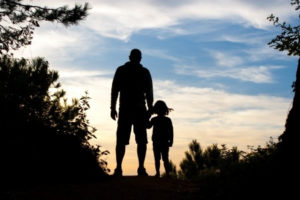Clueless as to its structural soundness, we crouched low and crawled on – upward, higher – atop the old church roof. Then came the loud crack of splintering wood.
Bukuria Mission Station rested near the top of a long sloping hill. Well before my wife and daughter and I moved there a student dormitory fashioned of sun-baked earth had got converted into a house of worship. After years of use and aging, the church roof’s mabati (corrugated iron sheets original to the structure) needed replacing.
Phil Harmon, my Canadian friend from Suna Mission 25 miles away, offered help. Phil was a gifted craftsman on many fronts. We donned our carpentry aprons and I followed his lead.
“How about we start here at this end and work our way to the front, eh?”
Armed with a claw hammer, I fell in behind him. Up the ladder we went. We began wresting old nails from the rafters, taking care then to pass the rusting metal sheets to workers waiting below.
“I guess this wood under us is OK – you know, sturdy enough, not too termite-eaten.”

Now and then throughout the morning we felt movement, first my friend, then myself – a slight tremble along the old trusses – our only support preventing us plummeting downwards. The roof would creak. We would freeze in place, sometimes with a hammer just-poised to extract the next nail. Then cautiously proceed with our task.
Finally, the roof’s surface was uncovered, it’s purlins denuded, leaving no trace of tin sheets anywhere.
Phil and I maneuvered to the building’s wall-plate at its west end. Standing on it, he reached down. With a gloved hand my friend casually flipped free a stubby piece of loosely-braced two-by-four. I will never forget what followed.
The whole network of roofing, hundreds and hundreds feet of rafter and truss, instantly gave way. At the frightful splintering sound of lumber suddenly breaking apart, our two African helpers below lurched to the side for safety. The crash unleashed a rumbling boom. Dust came billowing all around. My Canadian bud and I breathed relief seeing the workers yet standing – their bodies hugged to the walls – clearly shaken, but intact.
Powderpost beetles, we later discovered, had been dining on the church’s canopy a good while, devouring the lumber, riddling it throughout with tiny pinholes.
In the crash’s aftermath, standing poised atop the wall, we silently took in the splintered crisscross of rubbish scattered before us ten feet below. Essentially a pile of sawdust lay there, material upon which we had entrusted our weight most all morning. At last Phil turned my way, releasing a low chuckle.
“Looks like we’re spared taking apart the frame.”
“Yeah, and seems a guardian angel or two got in some overtime today.”
© 2017 Jerry Lout





